Demolition Contractors Elizabeth
Top 10 Demo Companies in Elizabeth
Receive up to 3 Demolition Company Near Me quotes for your project today! Compare profiles, reviews, accreditations, portfolio, etc... and choose the best deal.

Short Excavating Inc.
54 reviews100 Short Line, Stratford, N0L 1N0, USAbout Short Excavating Short Excavating is a family-owned and operated business with over 20 years of experience in the excavating industry. We are committed to providing our clients with high-quality services at competitive prices. We are fully licensed and insured, and we have a team of experienced and qualified professionals who are dedicated to exceeding your expectations. We offer a wide range of excavating services, including: Site preparation Grading Demolition Foundation work Utility installation And more! We are committed to providing our clients with the highest level of customer service. We are always available to answer your questions and address your concerns. We are also committed to working with you to ensure that your project is completed on time and within budget. Contact us today for a free estimate!
- Services
- Why Us?
Get Quote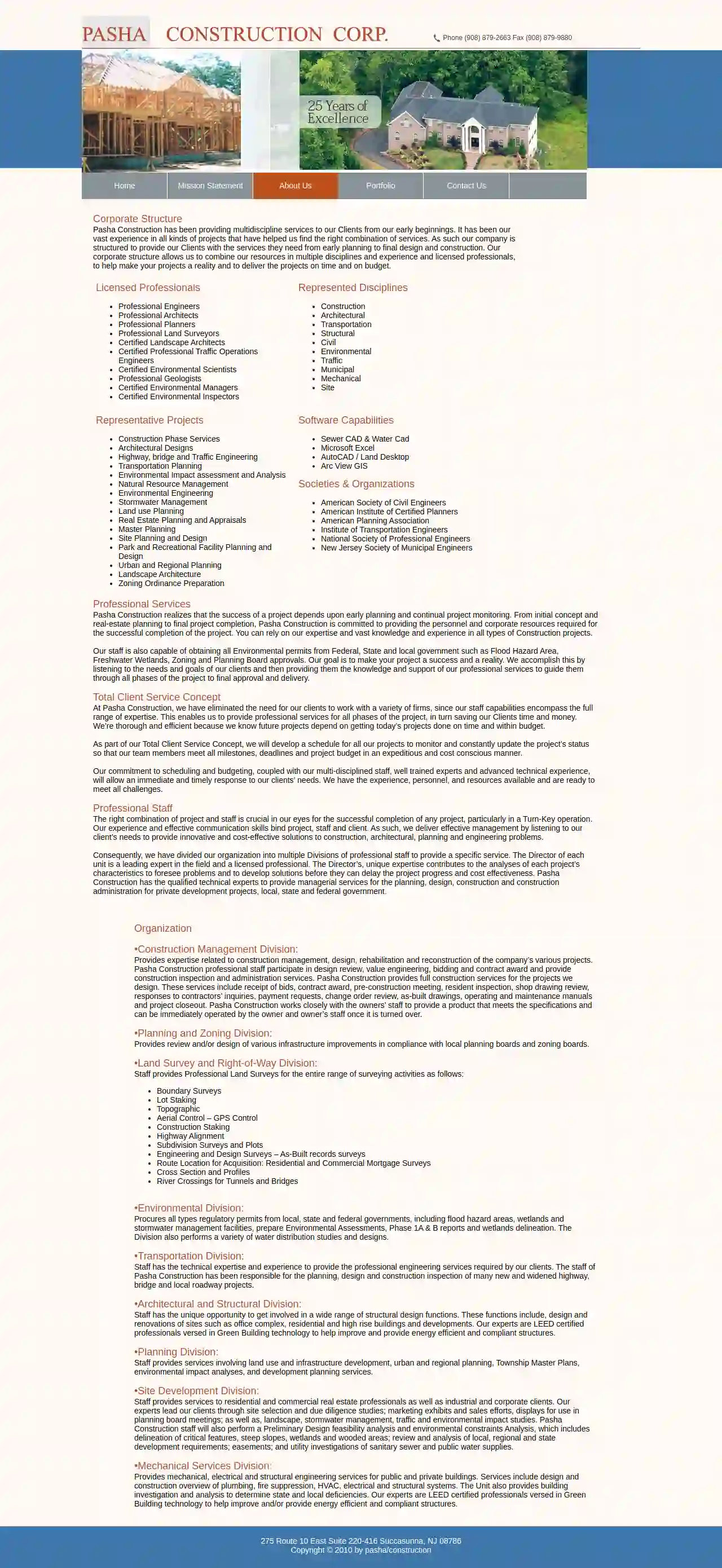
Pasha Construction
1275 Route 10 East Suite 220-416, Succasunna, 08786, USAbout Us Pasha Construction has been providing multidiscipline services to our Clients from our early beginnings. It has been our vast experience in all kinds of projects that have helped us find the right combination of services. As such our company is structured to provide our Clients with the services they need from early planning to final design and construction. Our corporate structure allows us to combine our resources in multiple disciplines and experience and licensed professionals, to help make your projects a reality and to deliver the projects on time and on budget. Licensed Professionals Professional Engineers Professional Architects Professional Planners Professional Land Surveyors Certified Landscape Architects Certified Professional Traffic Operations Engineers Certified Environmental Scientists Professional Geologists Certified Environmental Managers Certified Environmental Inspectors Represented Disciplines Construction Architectural Transportation Structural Civil Environmental Traffic Municipal Mechanical Site Representative Projects Construction Phase Services Architectural Designs Highway, bridge and Traffic Engineering Transportation Planning Environmental Impact assessment and Analysis Natural Resource Management Environmental Engineering Stormwater Management Land use Planning Real Estate Planning and Appraisals Master Planning Site Planning and Design Park and Recreational Facility Planning and Design Urban and Regional Planning Landscape Architecture Zoning Ordinance Preparation Software Capabilities Sewer CAD & Water Cad Microsoft Excel AutoCAD / Land Desktop Arc View GIS Societies & Organizations American Society of Civil Engineers American Institute of Certified Planners American Planning Association Institute of Transportation Engineers National Society of Professional Engineers New Jersey Society of Municipal Engineers Professional Services Pasha Construction realizes that the success of a project depends upon early planning and continual project monitoring. From initial concept and real-estate planning to final project completion, Pasha Construction is committed to providing the personnel and corporate resources required for the successful completion of the project. You can rely on our expertise and vast knowledge and experience in all types of Construction projects. Our staff is also capable of obtaining all Environmental permits from Federal, State and local government such as Flood Hazard Area, Freshwater Wetlands, Zoning and Planning Board approvals. Our goal is to make your project a success and a reality. We accomplish this by listening to the needs and goals of our clients and then providing them the knowledge and support of our professional services to guide them through all phases of the project to final approval and delivery. Total Client Service Concept At Pasha Construction, we have eliminated the need for our clients to work with a variety of firms, since our staff capabilities encompass the full range of expertise. This enables us to provide professional services for all phases of the project, in turn saving our Clients time and money. We’re thorough and efficient because we know future projects depend on getting today’s projects done on time and within budget. As part of our Total Client Service Concept, we will develop a schedule for all our projects to monitor and constantly update the project’s status so that our team members meet all milestones, deadlines and project budget in an expeditious and cost conscious manner. Our commitment to scheduling and budgeting, coupled with our multi-disciplined staff, well trained experts and advanced technical experience, will allow an immediate and timely response to our clients’ needs. We have the experience, personnel, and resources available and are ready to meet all challenges.
- Services
- Why Us?
- Gallery
Get Quote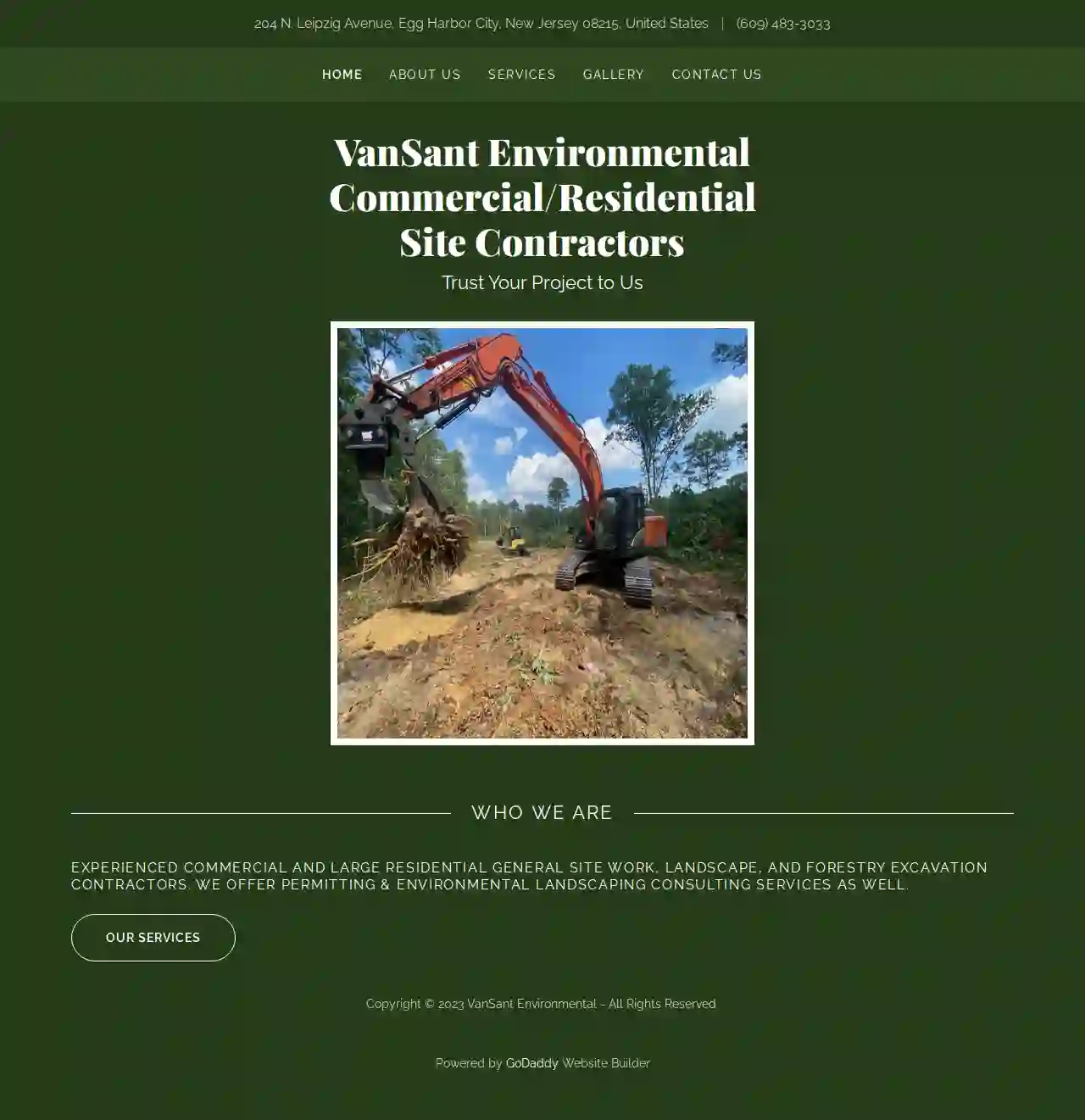
VanSant Environmental Landscaping & Site Work
51 reviews204 North Leipzig Avenue, Galloway, 08215, USWho We Are Experienced Commercial and LARGE Residential General Site work, Landscape, and Forestry EXCAVATION Contractors. We offer permitting & environmental landscaping consulting services as well. Our Team Barry VanSant Barry is the owner and the company's Horticulturist and Landscape Designer/Consultant. He has over 45 years experience in multiple areas of the industry. Samuel VanSant Sam is the company's Project and Construction Manager. He oversees the day-to-day operations and all heavy equipment operations. Adam Wolff Adam is our field engineer. He is a graduate of East Carolina University in construction management and LEED Certified. Frequently Asked Questions Are you insured and licensed? We have all necessary licenses for our area, and we carry insurance for all of our projects. What kind of landscaping do you do? Our specialty is in natural and native plant material and methods that fit the ecology of our area. We proudly support and volunteer for: Team Rubicon USA Volunteer Partner Since Oct. 2016 Habitat For Humanity Volunteer Partner Since Oct. 2016 U.S. Fish and Wildlife Services Volunteer Partner Since Dec. 2018
- Services
- Why Us?
- Our Team
- Gallery
Get Quote
C Abbonizio Contractors
3.812 reviewsAtlantic City, US- Services
- Why Us?
Get Quote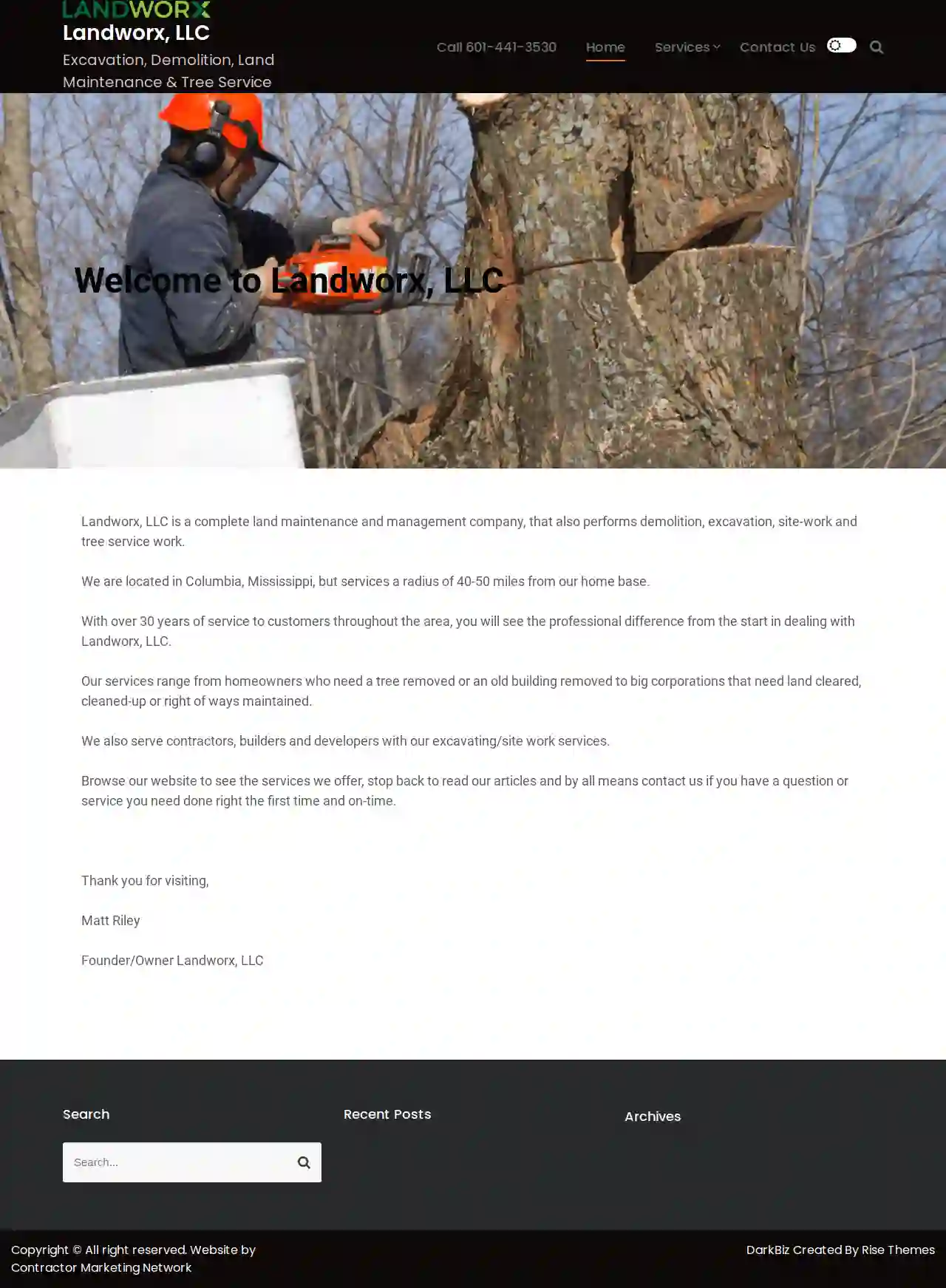
Landworx, LLC
52 reviewsBrick, USWelcome to Landworx, LLC Landworx, LLC is a complete land maintenance and management company, that also performs demolition, excavation, site-work and tree service work. We are located in Columbia, Mississippi, but services a radius of 40-50 miles from our home base. With over 30 years of service to customers throughout the area, you will see the professional difference from the start in dealing with Landworx, LLC. Our services range from homeowners who need a tree removed or an old building removed to big corporations that need land cleared, cleaned-up or right of ways maintained. We also serve contractors, builders and developers with our excavating/site work services. Browse our website to see the services we offer, stop back to read our articles and by all means contact us if you have a question or service you need done right the first time and on-time. Thank you for visiting, Matt Riley Founder/Owner Landworx, LLC
- Services
- Why Us?
- Gallery
Get Quote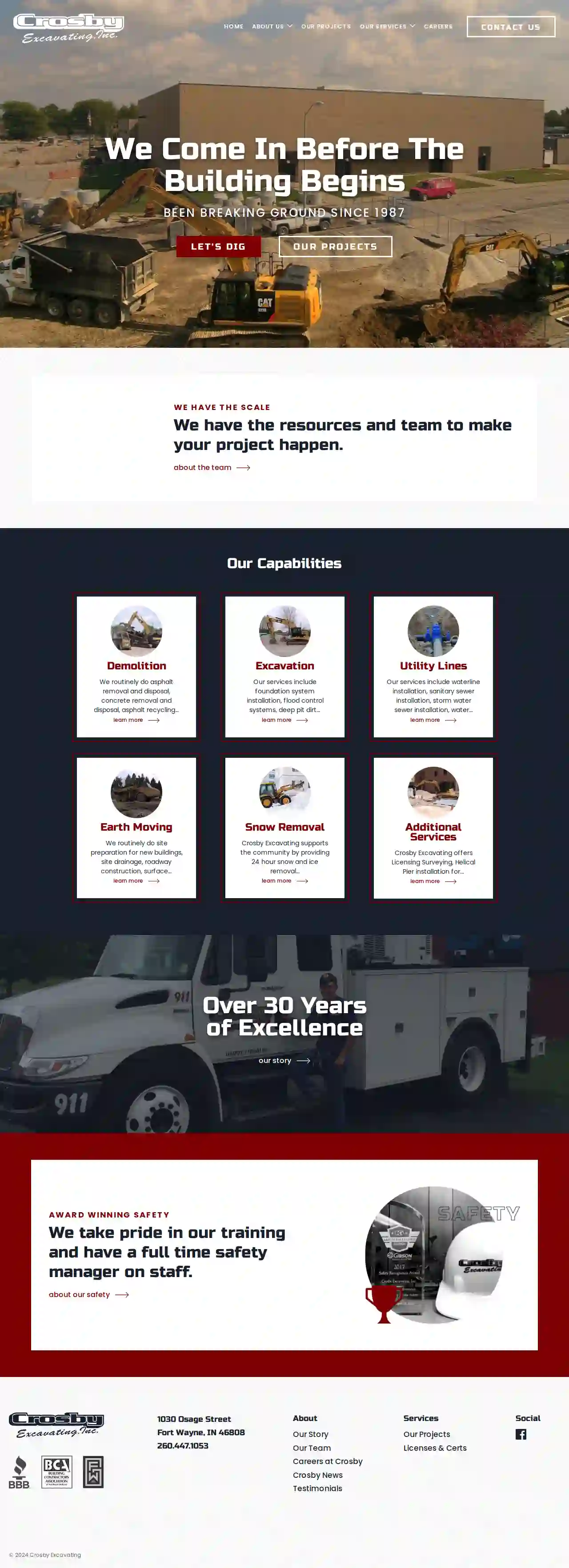
Crosby Excavating Inc
3.515 reviews1030 Osage St, Fort Wayne, 46808, USYesterday and Today One man, one truck and a vision. In 1987, our founder, Steve Crosby, had a vision, and a passion. Steve had been raised in a “construction family”. Steve’s father worked for a local construction company, and encouraged Steve to tag along with him as he went to construction sites throughout the region. It was only natural that Steve would enter the construction industry when he began his own career. Thirty-five years later, he is still here. Steve loved trucking, and moving dirt. He started Crosby Excavating very humbly, with a single dump truck. Against all odds, and through sheer determination and dedication, Steve’s little company began to take shape. One truck led to two, then his first employee, and the die was cast. Crosby’s fleet of trucks grew, as did the type and size of equipment. Today Crosby Excavating operates from its renovated facility at 1030 Osage Street, near downtown Fort Wayne. The four acre site also includes a fully staffed maintenance shop and covered equipment storage area. As a result of its focus on quality, on time performance, and cost effective pricing, Crosby Excavating is enjoying steady growth in all of its market segments. This growth has allowed Crosby Excavating to attract the best talent in the region, making Team Crosby the envy of the industry. In order to keep up with the demand for its services, Crosby Excavating has been acquiring new and more efficient capital equipment. Whether it’s pavement demolition, earth moving, excavation, or snow removal, Crosby has the right piece of equipment to do the job. No job is too large or too complex for Crosby Excavating. In 2013 Crosby Excavating grew 93 percent when compared to 2012. Growth continues at an impressive rate, in all areas of its business. This growth is the result of Crosby’s core principles: Safety first Do it right the first time Do it on time Provide unsurpassed value to our clients Crosby Excavating has been providing total site development services since 1987. It has never failed to complete a contract, and stands ready to perform for you. Our Mission We strive to maintain the highest degree of technology in the industry, so that we can offer our customers the best solutions to their needs. All Crosby Excavating employees are dedicated to the understanding that our customers are the most important people. Our customers are NOT dependent on us….we are dependent on them. Our company will continue to thrive and grow by maintaining our mission and our commitment to our customers. Award Winning Safety We take pride in our training and have a full time safety manager on staff.
- Services
- Why Us?
- Testimonials
- Gallery
Get Quote
Four J Excavation
51 reviews2900 Broadmoor Drive, Las Cruces, 88001, USFour J Excavation: Your Trusted Partner for Dirt Work and Excavation in Las Cruces, NM Four J Excavation is a locally owned and operated dirt work and excavation company serving Las Cruces, Dona Ana County, New Mexico, and El Paso, Texas. We are a team of experienced professionals dedicated to providing high-quality excavation services for residential, commercial, and industrial projects. We are committed to delivering exceptional results, exceeding expectations, and building lasting relationships with our clients. As a retired Army Veteran, I bring a strong work ethic and commitment to excellence to every project. We understand the importance of timely completion, meticulous attention to detail, and working within budget. We are proud to serve our community and contribute to the growth and development of our region. At Four J Excavation, we are more than just an excavation company. We are your trusted partner, dedicated to helping you achieve your project goals. We take pride in our work and strive to build long-term relationships with our clients based on trust, communication, and mutual respect.
- Services
- Why Us?
- Gallery
Get Quote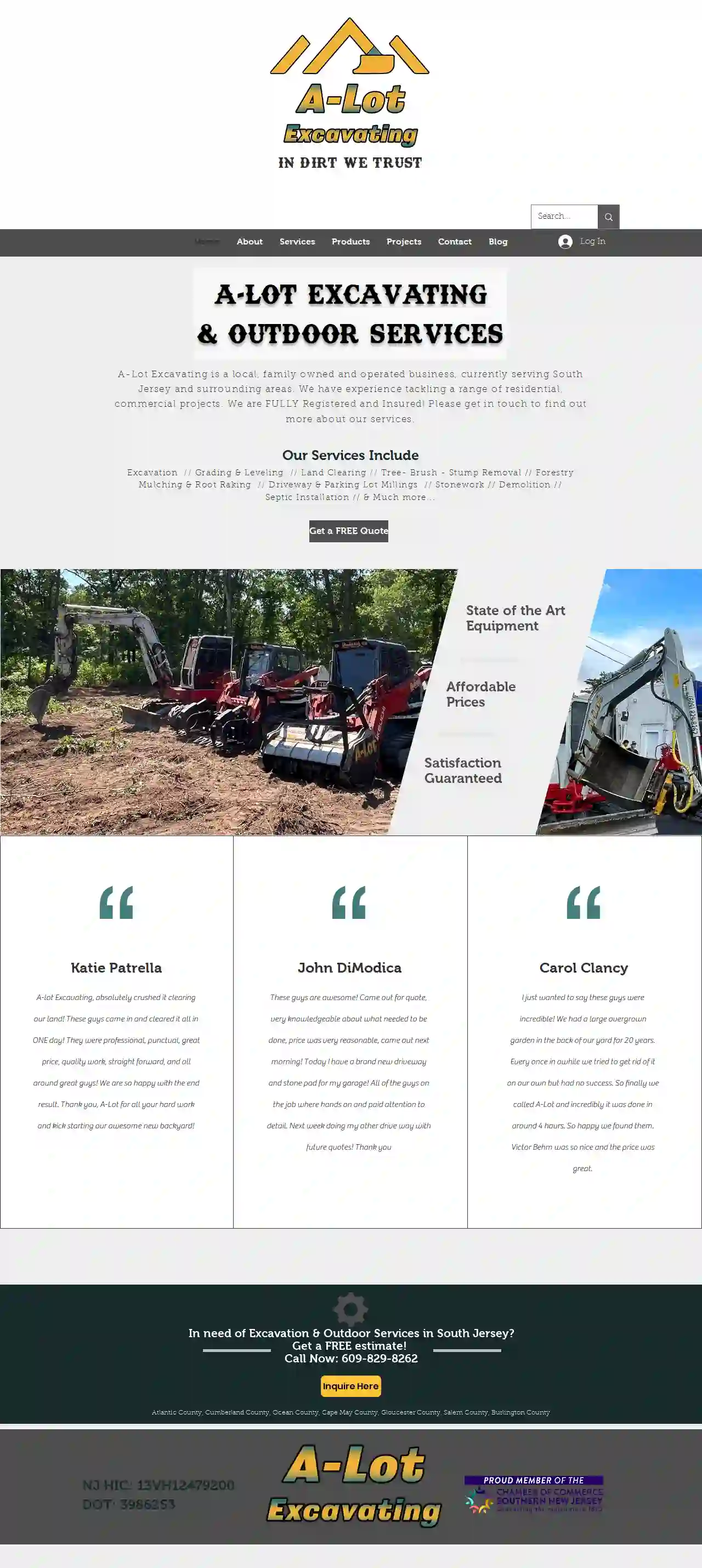
A-Lot Excavating
4.713 reviewsAtlantic City, USA-Lot Excavating & Outdoor Services A-Lot Excavating is a local, family owned and operated business, currently serving South Jersey and surrounding areas. We have experience tackling a range of residential, commercial projects. We are FULLY Registered and Insured! Please get in touch to find out more about our services. Our Services Include Excavation // Grading & Leveling // Land Clearing // Tree- Brush - Stump Removal // Forestry Mulching & Root Raking // Driveway & Parking Lot Millings // Stonework // Demolition // Septic Installation // & Much more... Get a FREE Quote State of the Art Equipment // Affordable Prices // Satisfaction Guaranteed
- Services
- Why Us?
- Testimonials
- Gallery
Get Quote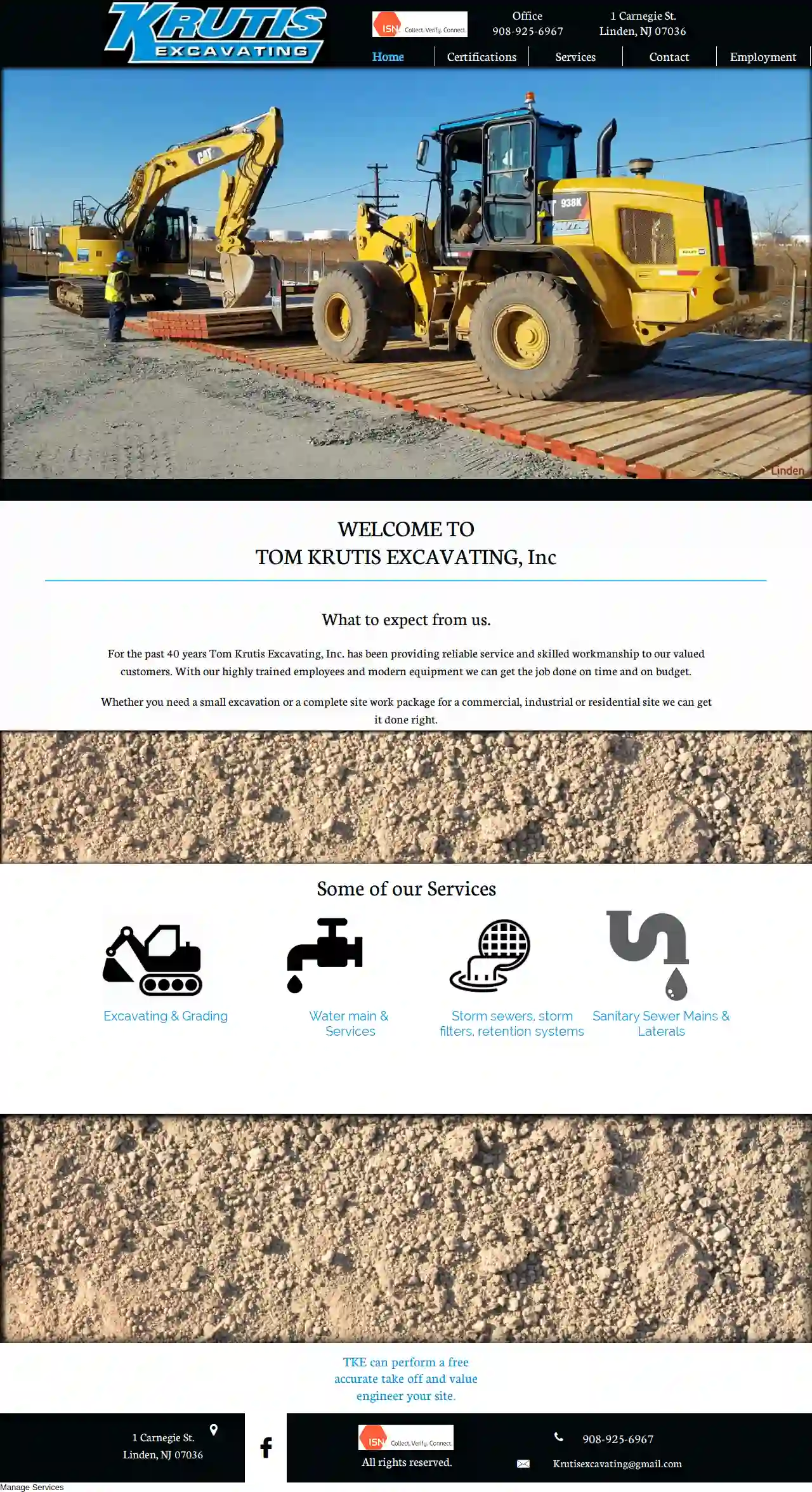
Tom Krutis Excavating Inc
4.612 reviews123 Main Street, Cityville, 12345, USKruti Excavating: Your Trusted Partner for Excavation Services Kruti Excavating is a reputable and experienced excavation company serving the [CITY] area. We are committed to providing high-quality services at competitive prices. Our team of skilled professionals is dedicated to delivering exceptional results on every project, no matter how big or small. We understand that excavation projects can be complex and require careful planning and execution. That's why we take a personalized approach to every job, working closely with our clients to ensure their needs are met. From site preparation to utility installation, we handle all aspects of your excavation project with precision and efficiency. At Kruti Excavating, we are committed to safety and environmental responsibility. We use the latest equipment and techniques to minimize disruption and ensure a clean and safe work environment. Our goal is to exceed your expectations and deliver a project that you can be proud of.
- Services
- Why Us?
- Testimonials
Get Quote
Tractor Solutions, LLC
1Wayne, USGet More Work Done... Tractor Solutions, LLC is a skilled landscape excavating contractor dedicated to providing high-quality services and exceeding client expectations. We understand the importance of efficiency and effectiveness in your projects, and we strive to deliver results that meet your specific needs.
- Services
- Why Us?
- Gallery
Get Quote
Over 3,943+ Excavation Pros in our network
Our excavation experts operate in Elizabeth and surroundings!
ExcavationHQ has curated and vetted Top Excavation Businesses in and around Elizabeth. Find a top & reliable business today.
Frequently Asked Questions About Demolition Contractors
- General Liability Insurance: Covers bodily injury or property damage to third parties caused by the contractor's negligence.
- Workers' Compensation Insurance: Provides benefits to workers injured on the job.
- Pollution Liability Insurance: Covers costs associated with environmental contamination caused by demolition activities.
- Professional Liability Insurance: Protects against claims of negligence or errors in professional services, such as demolition planning or consulting.
- Project Assessment: The demolition contractor evaluates the structure, site conditions, and project requirements.
- Permitting: Obtain necessary demolition permits from local authorities.
- Site Preparation: Secure the site, disconnect utilities, and remove any valuable or reusable items.
- Hazardous Material Abatement: Professionally remove asbestos, lead paint, or other hazardous materials if present.
- Demolition: Execute the chosen demolition method, bringing down the structure safely and efficiently.
- Debris Removal and Site Cleanup: Sort, process, and dispose of demolition debris responsibly. Clean up the site to prepare it for future use.
- Size and Type of Structure: The method should be suitable for the structure's size, height, and construction materials.
- Site Location and Accessibility: The method should be feasible given the site's location, surrounding buildings, and access constraints.
- Environmental Considerations: Prioritize methods that minimize environmental impact, such as deconstruction or selective demolition if feasible.
- Budget: Different demolition methods have varying costs, so choose one that fits your budget.
- Safety: Prioritize methods that ensure worker safety and minimize risks to surrounding areas.
What is the importance of insurance in demolition projects?
What is a demolition bond?
What are the steps involved in a typical demolition process?
How do I choose the right demolition method for my project?
What is the importance of insurance in demolition projects?
- General Liability Insurance: Covers bodily injury or property damage to third parties caused by the contractor's negligence.
- Workers' Compensation Insurance: Provides benefits to workers injured on the job.
- Pollution Liability Insurance: Covers costs associated with environmental contamination caused by demolition activities.
- Professional Liability Insurance: Protects against claims of negligence or errors in professional services, such as demolition planning or consulting.
What is a demolition bond?
What are the steps involved in a typical demolition process?
- Project Assessment: The demolition contractor evaluates the structure, site conditions, and project requirements.
- Permitting: Obtain necessary demolition permits from local authorities.
- Site Preparation: Secure the site, disconnect utilities, and remove any valuable or reusable items.
- Hazardous Material Abatement: Professionally remove asbestos, lead paint, or other hazardous materials if present.
- Demolition: Execute the chosen demolition method, bringing down the structure safely and efficiently.
- Debris Removal and Site Cleanup: Sort, process, and dispose of demolition debris responsibly. Clean up the site to prepare it for future use.
How do I choose the right demolition method for my project?
- Size and Type of Structure: The method should be suitable for the structure's size, height, and construction materials.
- Site Location and Accessibility: The method should be feasible given the site's location, surrounding buildings, and access constraints.
- Environmental Considerations: Prioritize methods that minimize environmental impact, such as deconstruction or selective demolition if feasible.
- Budget: Different demolition methods have varying costs, so choose one that fits your budget.
- Safety: Prioritize methods that ensure worker safety and minimize risks to surrounding areas.